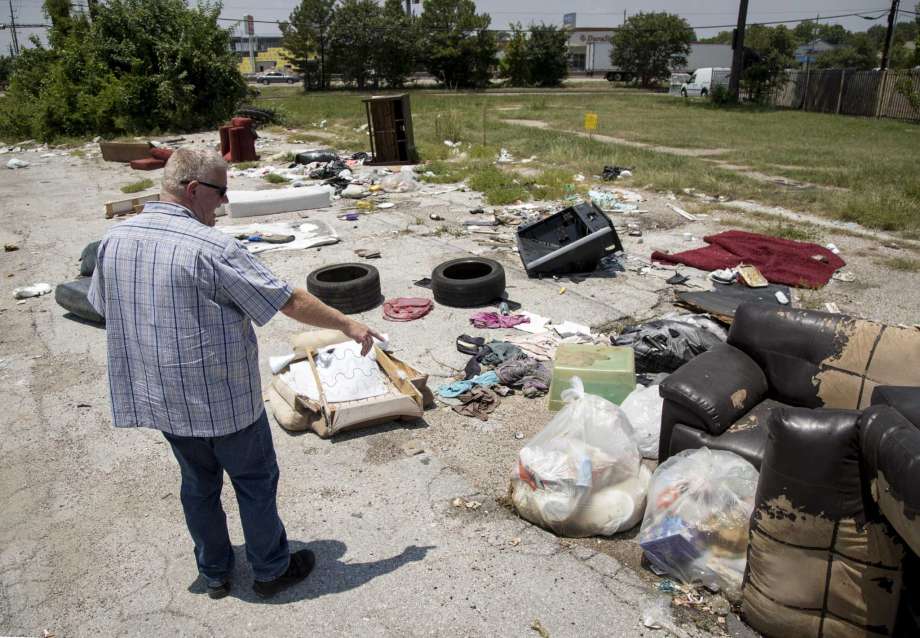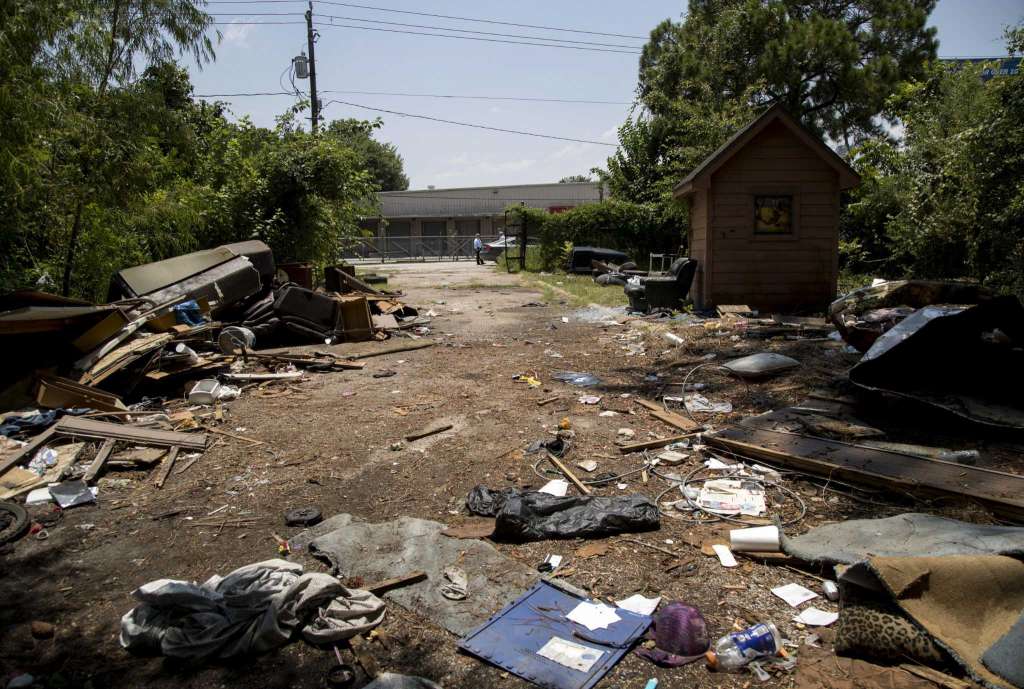Randy Scales perches on the edge of his chair, eyes squinting as he watches footage of a young man in a red-and-black work uniform hopping out of a cargo truck carrying a mountain of trash.
This is Scales’ morning routine: Get to work and fire up last night’s surveillance tapes, beginning a new chapter of the never-ending investigation into illegal dumping in Houston. Today, his subject is a perpetrator who pays two strangers a few bucks to help him unload a pile of oil drums, tires and more than a dozen wooden pallets into a ditch on the otherwise deserted road.
At the crime scene, investigators overwhelmed by the rancid smell of petroleum and stewing trash take pictures and comb for evidence. The company name on the side of the truck, the address listed on an oil drum and other clues they collect could help lead them to the suspect.
“We catch 1 percent of the 1 percent of people violating,” Scales said. “Everyday there are people dumping trash on land or in waterways.”
Scales, a Harris County Environmental Crimes Unit lieutenant, and his team of nine investigators depend heavily on video cameras to crack down on illegal dumping, a crime that disproportionally affects the city’s poorest neighborhoods.
The City Council voted last month to add 22 cameras to create a portfolio of nearly 150 total. Precinct 1’s nearly $600,000 program also includes a fleet of drones, as well as several full-time employees.
It’s paying dividends: A two-year program started in 2016 to catch those who illegally dump their trash in remote locations across Houston yielded 694 investigations and 396 charges.
“It’s been working for the city as a whole — better than what we thought,” said Jerry Davis, the councilman for District B, who initiated the program to catch illegal dumping.
The majority are people charged in the crime are private citizens: The average offender is a 50-year-old who dumps 75 pounds of waste, according to statistics the county provided. Contractors looking to dodge the expense of paying to throw away their garbage at a designated facility account for just 20 percent of offenders.
Custom-designed cameras track movement of cars and people and automatically zoom, according to Assistant Chief Deputy Chris Gore. And where the cameras can’t go, drones can. They are flown once a week to gather evidence, Precinct 1 Constable Alan Rosen said, adding that they can obtain search warrants through the District Attorney’s office when needed. For instance, Rosen said drones could be used to track a business that has been routinely dumping in a back parking lot.
“Our drone pilot can fly above a scene if we need them to with the proper paperwork and get video footage that way as well,” he said. “When you have video evidence, it’s pretty conclusive.”
Video evidence is all the District Attorney’s Office needs to prosecute someone. Prosecutors who specialize in environmental crimes can charge violators with anything from a Class C misdemeanor, the equivalent of a traffic ticket, to a felony depending on the weight, quality and type of debris.
Waste greater than 1,000 pounds can lead to a felony. Toxic chemicals or waste dumped into water can also carry more severe charges.
The suspect caught in the most recent footage could face two felony charges: One for illegally dumping roughly 2,000 pounds of trash and the other for illegally dumping used oil cans. To make matters worse, the trash was dumped roughly 50 feet away from the bayou, which leads to the Ship Channel and Galveston Bay.
A person charged under the Used Oil Collection Act — which prohibits the dumping of used oil, which contains total petroleum hydrocarbons and metal shavings that can harm wildlife and pollute waterways — faces an automatic fine of $50,000.
Beyond just being eyesores, illegal dumping sites present serious consequences, including being safety hazards and serving as a breeding ground for potentially disease-ridden mosquitoes, snakes and other wildlife. Dumping sites can also contribute to flooding and could potentially have a serious impact in future weather disasters.
“When you have drains that have been stopped up because people put furniture and tires and plastic, it’s going to cause flooding,” Rosen said.
He said people often begin dumping sites in ditches, where water collects and carries debris downstream, blocking waterways. But Rosen said it is especially unfair because it affects the quality of life for many communities.
“Is it right that people illegally dump in one neighborhood, but they don’t in another neighborhood?” he said. “We have to protect those vulnerable neighborhoods from people who go into the neighborhoods that are more vulnerable and trash them.”
Chris Powell, who lives down the street from the crime scene being investigated, said he has given up on the site because it routinely goes through a cycle of being cleaned up and then trashed.
“I don’t know what can be done,” Powell said, holding his 10-month-old son Frederick on his hip. “No one is watching it consistently,” unaware of the cameras which are monitoring the road.
He said the solution is community members “taking ownership” of the neighborhood.
“Whatever our city is spending money on, it will only change with more development,” he said.
Rosalind Raikes, Powell’s 64-year-old neighbor, grew up on the block and called it aggravating and frustrating to watch her neighborhood being trashed.
“It’s just nasty,” she said with disgust. “I’m sick of it.”
Her home first belonged to her grandmother, and the address is listed on the birth certificates of her 10 brothers and sisters, but the living conditions have pushed her to move.
She calls the health department, the city’s 311 hotline for illegal dumping and animal control. She is an active member of her community who makes the effort to maintain her property with groomed flower beds and a tidy front porch
“Why should I have to move out of my grandmother’s house?” she demanded.
Raikes was unaware of the steps the city is taking to crack down on the dumping.
But in the shadows, the Environmental Crimes Unit carries on its investigation. “It’s just a matter of when we’re gonna catch you,” Scales said. “Not if, but when. We’ll catch you.”




